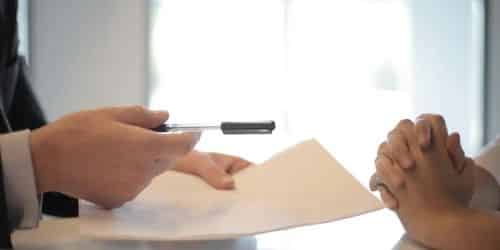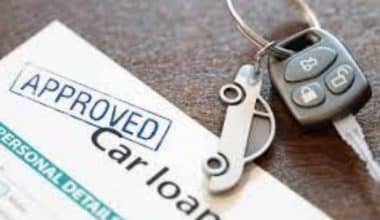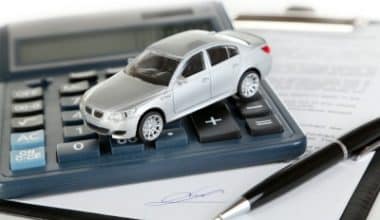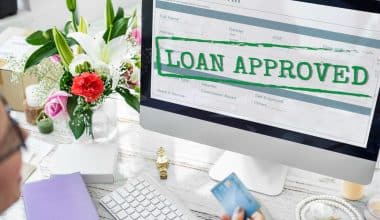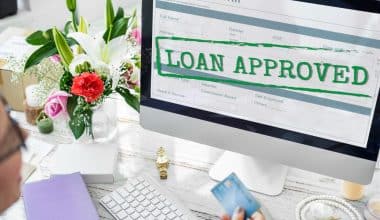To get an unsecured business loan, you don’t need to put up any kind of collateral, like machinery, inventory, or real estate. Instead, you will probably have to sign a personal guarantee, which gives the lender the right to take any of your personal assets (like a house, car, or cash) if you don’t pay back the unsecured loan. This article talks about the rates of unsecured business loans for startups and bad credit.
How an Unsecured Loan Works
Unsecured loans, which are also called signature loans or personal loans, do not need collateral to be approved. A borrower’s credit score is often used to decide things about a loan, like whether or not it will be approved. Most of the time, people need a high credit score to get an unsecured loan.
A secured loan is one where the borrower puts up an asset as collateral. This is different from an unsecured loan, where the borrower doesn’t have to put up anything as collateral. The pledged assets make the loan seem “safe” to the lender. Secured loans are common and include mortgages and vehicle financing.
Because unsecured loans have higher credit score requirements than secured loans, people with lower credit scores may be able to get loans if they can find a co-signer. When someone co-signs a loan, they also take on the responsibility of paying back the loan if the main borrower doesn’t. The borrower has “defaulted” on the loan or debt when they don’t make the agreed-upon payments of interest and principal.
When a borrower doesn’t pay back a secured loan, the lender may take back the collateral. If a borrower doesn’t pay back an unsecured loan, the lender can’t take any of the borrower’s property. But the lender still has options, like hiring a debt collection agency or filing a lawsuit to force payment. If the lender wins in court, they can take money out of your paycheck. A lien could be put on the debtor’s property, if they have one, or legal action could be taken to force the debtor to pay. If a borrower doesn’t pay back a loan, their credit score may go down, among other things.
Unsecured Business Loans Rates
Borrowing money is a common way for businesses to pay for expensive purchases, invest in growth, and boost cash flow. The problem is that getting money from someone always comes with some kind of cost. If you know the average interest rate on a business loan, you can decide if it’s a good idea for your business to get one.
Most interest rates on loans are given as annual percentage rates (APR). When figuring out a loan’s annual percentage rate (APR), interest is added to any fees or other costs you may have, such as:
- Fees are Paid at the Point of Origin.
- Costs associated with processing.
- Financing Costs.
- Charges for Filing an Application.
So, the APR of a loan is usually higher than the interest rate, but it gives a better idea of how much it will cost to borrow in total. With the loan amount, the length of the loan, and the interest rate, you can use a calculator to figure out how much a business loan will cost.
More Details
Depending on the lender and the type of loan, the interest rate on a business loan could be very different. Since the federal funds rate has gone up since Q3, and other rates tend to follow suit, it’s likely that these averages are now higher.
Here are some examples of introductory rates to think about, depending on the type of loan and the lender. Keep in mind, though, that many lenders don’t advertise their highest rates, so if you have bad credit, the rate you’re offered could be much higher. Here are some businesses that offer unsecured business loans with rates that are reasonable:
#1. OnDeck Capital
OnDeck Capital has both short-term loans and revolving credit lines for businesses that need money quickly. OnDeck’s business loans are not based on the value of any business collateral on the market. They offer loans of between $5,000 and $250,000. OnDeck offers interest rates on their line of credit that range from 29.9% to 65.9%.
#2. Bluevine
There is a line of credit option available from Bluevine that is not asset-backed. You can borrow up to $250,000 and pay it back in 6 or 12 months. New borrowers can choose from rates as low as 6.2%. Since the loan can be paid back quickly, this line of credit may be the best choice for a business with unexpected costs or cash flow problems. You only have to pay back the amount of your credit line that you actually use.
For StreetShares funding, you need to have been in business for at least a year and have a credit score of at least 600. Still, you only need to make $25,000 a year, and rates start at just 7%. Because of this, StreetShares is a good choice for unsecured business loans for small and medium-sized businesses with slower growth rates.
Small Unsecured Business Loans
When a lender gives a company credit, they do not need collateral because their decision is based on how creditworthy the owner is. Personal credit must be good for a small business owner to be considered for this kind of loan. The obvious benefit is that the business owner doesn’t have to put up personal assets as collateral in order to get funding. Still, the lender may charge a higher interest rate to make up for the extra risk. Here are some examples of loans for small businesses that don’t have to be paid back.
#1. Loans for a Set Amount of Time
A term loan is a type of business financing that doesn’t require collateral. Borrowers get a lump sum of money and have to pay back the loan plus interest over a set amount of time. Term loans are long-term loans with a set schedule for paying them back and an interest rate that is either fixed or can change. Term loans can be used for a wide range of things, such as buying equipment and supplies, expanding current activities, and getting money back for unexpected costs.
#2. A Company’s Credit Line
A line of credit for a business that is not secured is a set amount of money that can be borrowed from a lender as needed. Interest is only charged on the amount that was borrowed, and the principal amount that was paid back can be used right away. Most of the time, people use lines of credit to pay for immediate expenses like making payroll or buying stock. Depending on whether the interest rate is variable or fixed, borrowers may have to make minimum monthly payments or full payments every month.
Unsecured Business Loans for Bad Credit
Even if you or your business have bad credit, you may be able to get an unsecured loan if your business needs money and you are willing to pay a higher interest rate.
Alternative lenders are more likely to work with businesses with bad credit because they have more flexible lending requirements. Yes, the interest rates won’t always be as low as what regular banks offer, but they usually aren’t too far behind.
Access Commercial Finance and other alternative finance companies are growing faster than traditional banks, which are using more similar financial models. This suggests that they may be able to help you with your cash flow problems. The following are some ways that business firms with bad credit can get unsecured loans:
#1. Unguaranteed Business Loan
A loan is a sum of money that a company promises to pay back over time. Nonsecured denotes the absence of any assets or stock shares as security. But the shorter loan terms that are typical for these loans usually make up for the higher interest rates that come with them.
#2. Loans With Bad Credit
When financial statements and projections are strong, lenders are willing to give loans to companies with bad credit ratings.
#3. Cash Advance for a Business
The money you borrowed, in the beginning, is paid back as your sales go up. You get a lump sum of money right away, but you have to pay it back with a certain percentage of your future sales.
#4. Business Grants
Businesses can also ask the government for and get help from incentives to help them do well. A business that does well is better for the UK economy than one that fails. Don’t wait; start filling out grant applications right away.
#5. Crowdsourcing
If your business does well (or if you make a good pitch), private investors may want to back you. Their money could be the key to your success. Still, you’ll be giving them a piece of your business, and they’ll try to make money in some way.
#6. Obtaining a Loan From a Close Friend or Relatives
Almost half of all new businesses get their money from family and friends. This has been true as long as there have been business owners. It’s important to remember that your friends and family are the most important people in your life and will always have your back.
Your credit score will affect the interest rate you pay on any loan you get, but it doesn’t have to affect whether or not you get a loan for your business. You might be able to fix a low credit score if you apply for an unsecured business loan from the right sources and work to improve your credit.
Unsecured Business Loans for Startups
The average need for financing is highest for startups in the United States. Small business administration loans, credit cards, crowdsourcing, and secured and unsecured business start-up loans are just some of the ways that entrepreneurs use debt financing.
Unsecured business loans for startups can help pay for any of the first costs that come with starting a business. New small businesses often use loan money to pay for real estate, office space, equipment, supplies, inventory, and other start-up costs.
Unsecured business loans for startups provide the advantage of not requiring collateral. So, a small company start-up loan might provide the funds you need without requiring security from you or your organization.
Pros of Unsecured Business Loans
We’ll talk about some of the good things about unsecured business loans below;
- Getting an unsecured business loan can be helpful if your company has a high credit score and you can afford the interest rates.
- The first and most obvious benefit is that you don’t have to put up any property as security. As collateral for a loan, you can use real estate, cars, and even things like investment portfolios and corporate logos. If you don’t have to worry about the lender taking your valuables if you don’t pay back the loan, you can be sure that you won’t lose them.
- But if the borrower signs a personal guarantee to get an unsecured business loan, the lender may be able to take back the collateral. After all, the law would make sure that this deal was kept.
- Most of the time, unsecured business loans are easier to get because there is no collateral to look at. Unlike secured loans, which can’t be written off if your business goes bankrupt, unsecured loans can.
Qualifications for an Unsecured Loan
If you want to borrow money, lenders will want to know that they will get their money back. There are a few ways for lenders to figure out how much of a risk you are, so when you apply for an unsecured loan, they may ask you about the following (and change the terms accordingly):
#1. You Have to Check Your Credit
Banks and other places that lend money will look at your credit history to see how well you deal with debt. They want to see that you have a long history of using credit wisely (usually at least a year), making payments on time, keeping your credit card balances low, and having different types of accounts. Also, they will look at your credit scores, which are based on the information in your credit reports. Most of the time, the best interest rates are given to people with credit scores of 700 or higher.
#2. Your Income
When the lender knows you can pay back the loan, they are less likely to lose money. A pay stub from your most recent paycheck may be needed to prove to the lender that you have a steady source of income.
#3. What Is Your Debt-To-Income Ratio?
Add up all of your monthly debt payments and then divide that figure by your gross monthly income to get your debt-to-income ratio (DTI). Let’s say your total monthly debt payments are $500 and your monthly gross income is $2,000. The ratio of your debt to your income (DTI) would be 25%.
The lender will decide whether or not to give you a loan based on this number. We like ratios that have a lower number. The highest DTI that a lender will allow varies from lender to lender, but it rarely goes above 43%.
#4. Assets
Unsecured loans don’t need collateral, although the lender may still want to see that you have some savings. They think you’ll be less likely to miss loan payments if you have some money saved up in case something comes up.
Tips for Getting an Unsecured Loan
If you think that an unsecured loan is what you need, it’s easy to apply for one:
- Think about what you need and spend money on that. Even if the lender is willing to give you more, don’t borrow more than you need.
- Find the best loan companies you can. You can get loans without putting anything up as security from places like banks, credit unions, and online loan companies.
- Check out your options for loans with no collateral. Some loan companies will tell you if you’re likely to get a loan before you even apply. Compare what different lenders have to offer in terms of rates, fees, terms, APRs, and other perks.
- Now is the time to apply. After you’ve compared and chosen a lender from the initial loan offers you got, send in an official loan application. Most loan companies let you do this in person or online.
- Provide documentation. Give the lender any new information that they might need. For example, this could happen if you have bad credit.
- Accept that you need a loan and the money that comes with it. If you are approved, the lender will tell you how to get the money from your loan. Even if you’re paying back a loan in installments, you might get the money all at once. If you get a revolving loan, like a credit card, the lender will give you a credit card so you can get the money whenever you need it.
- If you take out an unsecured loan and want to keep your credit score in good shape, you must pay on time.
Can a Business Get an Unsecured Loan?
Unsecured business loans let businesses borrow money without having to put up anything as security. But since no collateral is needed, the interest rates on unsecured loans might be higher to make up for the higher risk for the lender.
What Is an Unsecured Business Loan?
With an unsecured business loan, you can borrow money to run your business. You don’t have to put up collateral to pay back the loan in equal monthly payments, and the lender won’t ask you to.
What Is an Example of an Unsecured Business Loan?
Credit cards, personal loans, and student loans are all types of unsecured loans. Since there is no security, most unsecured loans are given based on the borrower’s creditworthiness and history of paying back loans on time.
How Hard Is It to Get an Unsecured Business Loan?
It might be hard to get long-term, unsecured business loans. There are often options that last up to 25 years. To get a long-term, unsecured loan for your business, you’ll need a steady stream of income, a long history of running a business, and great credit.
Who Qualifies for an Unsecured Loan?
They want to see that you have a long history of using credit wisely (usually at least a year), making payments on time, keeping your credit card balances low, and having different types of accounts. Your credit scores will also be looked at. These are based on the information in your credit reports.
What Are the Requirements for an Unsecured Loan?
Unsecured loans are loans where you don’t have to put up anything as collateral. The lender gives it to you based on how good of a credit risk you are. This is why you need a high credit score to get an unsecured loan.
Conclusion
Most of the time, the interest rates on unsecured loans are higher than those on secured loans. These kinds of loans might not be the best choice for every business, but they can help when you need money quickly and don’t have anything to use as collateral. When a small business “cannot qualify for a standard loan or can’t negotiate better repayment terms with another lender,” the owner may look into getting an unsecured loan.
Related Articles
- UNSECURED PERSONAL LOAN: Loan Without Collateral
- UNSECURED BUINESS FINANCE: What it is and How it works
- UNSECURED DEBT: Definition, Types and Examples
- The 2023 Best Business Loans For Startups (Updated)
- BUSINESS LINE OF CREDIT: Meaning, How to Get It & Best Banks
